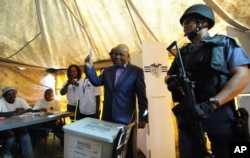After a closely-fought February 28 snap election in Lesotho, the Democratic Congress this week has cobbled together a coalition government with minor parties. It will be Lesotho’s second-ever coalition but for the small mountainous kingdom, the same problems that propelled the acrimonious breakdown of government last year threaten the new government as well.
The elections pitted the All Basotho Convention (ABC) - under incumbent prime minister Thomas Thabane - against its main rivals: the Democratic Congress (DC), led by former prime minister Pakalitha Mosisili, and the Lesotho Congress for Democracy (LCD), led by the then deputy prime minister Mothetjoa Metsing.
Mosisili’s DC won the most seats but failed to hit the magic number of 61 for an outright victory - prompting furious political negotiations.
Lesotho had not been meant to go to the polls until 2017, but a political crisis struck last year.
Looming defections from the tripartite coalition and a threatened no confidence vote prompted Prime Minister Thabane to suspend parliament. By August, Thabane had fled to South Africa claiming a military faction had attempted a coup.
The Southern African Development Community intervened, with South Africa’s Deputy President Cyril Ramaphosa brokering a deal to reopen parliament and hold elections two years early.
Speaking after the new coalition was announced this week, Ramaphosa said the vote was credible and the new government had its work cut out.
“Lesotho should begin the process of embarking on some reforms at a constitutional level, as well at a security level so as to ensure that they do not have a similar situation occurring again,” he said.
Issues remain
Critics say the SADC mission failed to tackle the fundamental issues.
One is the ill-defined roles of Lesotho's army and police. Another is that the constitution does not address what should happen to a coalition government should an MP decide to cross the floor and join another party.
Dimpho Motsamai, an analyst from the Institute of Security Studies Africa, says a prime minister beholden to a coalition is vulnerable to political blackmail.
“The coalition is fickle because the kingmakers are the small parties… if they feel that they cannot get what they want, they will broker a different deal with probably the opposition... There are no legal instruments that protect coalition governments… there is no floor-crossing legislation that prevents floor-crossing so the likelihood of defections from the coalition partners to other parties… is very very likely,” he said.
Adversarial politics
Motsamai says another indicator that there could be similar problems ahead for this coalition is the fact that the two major parties, the ABC and DC, which garnered the most votes, decided against an alliance.
“It really continues on the trend of Lesotho politics that are adversarial politics as opposed to focusing on a common vision for the country and focusing on policy issues that will move the country’s governance forward,” said Motsamai.
The ABC’s anti-corruption drive that had led to investigations into various opposition politicians are likely to be buried by the new administration. Investigations into the army’s role last August will be swept to one side, say analysts.
Lesotho journalist Marafaele Mohloboli says the public is skeptical about the government’s ability to rule effectively.
“People never wanted to go for elections… they feel that politicians acted out of greed for power and not for them as people. We are seeing another marriage of convenience. It is very imminent already that people already have their say on it that it’s not going to last,” said Mohloboli.
The constitution stipulates that a government be formed within 14 days after the Independent Electoral Commission announces the outcome of an election.












